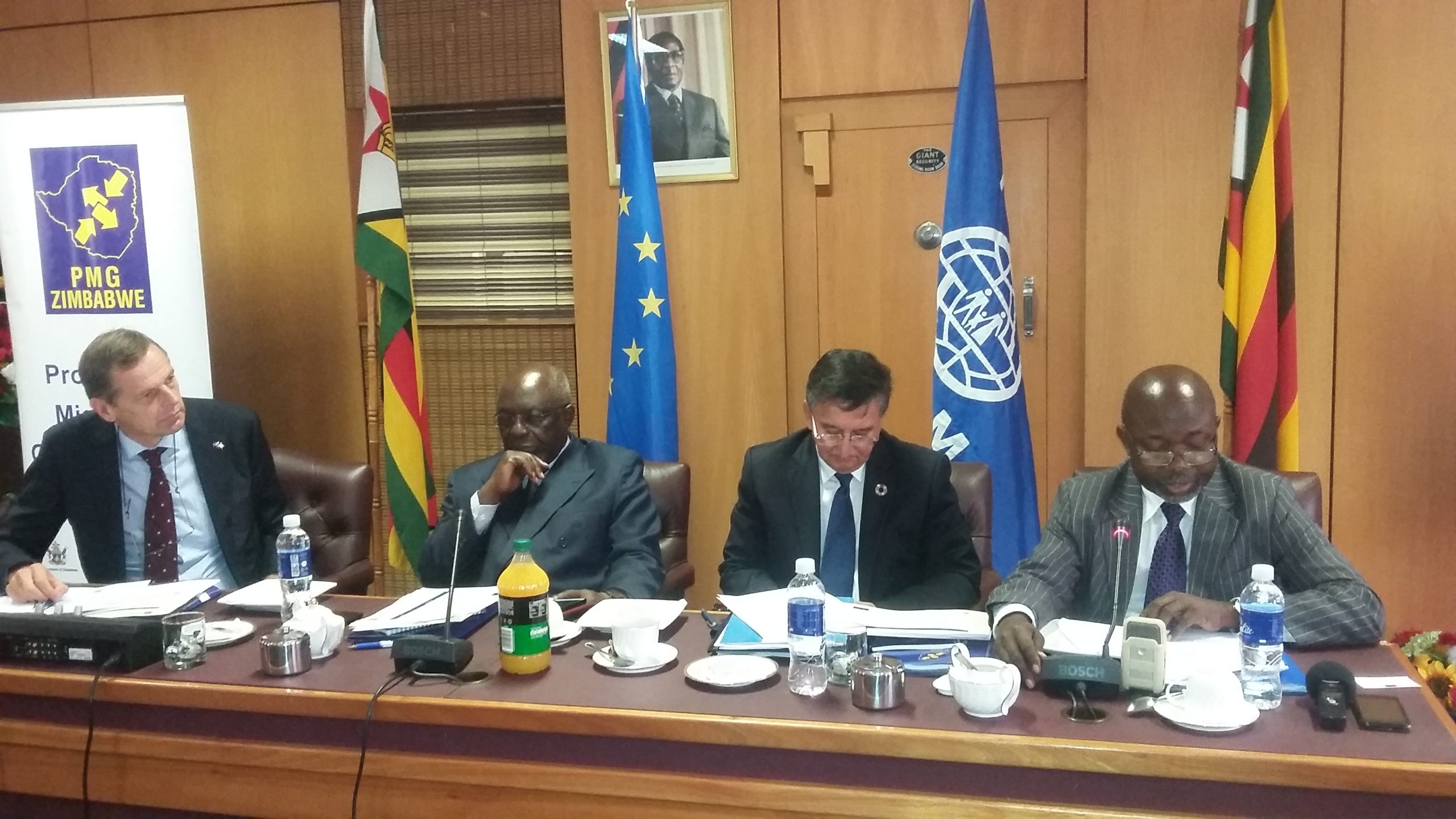By Byron Mutingwende
A well-managed migration system enables both governments and citizens to effectively utilise and access resources for economic growth, it has emerged.
This comes as international migration has risen to the top of the global policy agenda. According to the United Nations Department of Economic and Social Affairs (Trends in International Migrant Stock, 2015 Revision), with over 244 million international migrants (and about 740 million internal migrants) worldwide in search of economic opportunity, peace and security, the world is witnessing an era of unprecedented human mobility.
Ambassador Joey Bimha, the Permanent Secretary in the Ministry of Foreign Affairs made the call for having in place a well-managed migration system at the launch of “Promoting Migration Governance project in Zimbabwe (PMGZ) in Harare on 19 October 2017.
“A well-managed migration system enables both governments and citizens to effectively utilise and access resources, thereby contributing not only to the economic wellbeing of the citizens but also to the economic growth and social and political cohesion,” Bimha said.
As the scale, scope and complexity of migration has grown, the need to facilitate orderly, safe, regular and responsible migration and mobility is becoming increasingly relevant. Realising the benefits and full potential of migration requires planned, well-managed and well-governed approaches to migration and human mobility.
Bimha highlighted that Zimbabwe has been grappling with multiple and complex migration issues characterised by high levels of cross border mobility, increased trafficking in persons, human smuggling and mixed migration flows.
“It was in response to these complex migration challenges that the government of Zimbabwe focused on developing migration policies through a ‘whole of government’ approach, in close collaboration with government and non-governmental stakeholders.”
Philippe van Damme, the Head of the Delegation of the European Union to Zimbabwe said migration had been integrated in the global development framework of the 2030 Agenda for Sustainable Development. The 10th Sustainable Development Goal explicitly recognises the positive contribution of migrants for inclusive growth and sustainable development. The EU has solid approaches and interventions to protect the rights of migrants, tackle discrimination and inequalities and promote the positive impact of migration worldwide.
He hailed the African Union for adopting legal and policy instruments intended to regulate migration on the continent. As per the 2063 Agenda, Africa aspires ‘to be a continent of seamless borders, with free movement of people, that has dynamic and mutually beneficial links with her Diaspora and that has no human trafficking.”
“Everywhere migration has become an issue of key national interest and Zimbabwe is no exception. At the bilateral level, the European Union is providing approximately 3 million Euro for the PMGZ project. Together, we stand by Zimbabwe and its efforts to establish a governance framework that allows state actors to manage migration in dialogue with non-state actors,” van Damme said.
The Migration Governance in Zimbabwe project was launched ahead of the inaugural meeting of the Sector Policy Review Committee. The launch was made possible through a government partnership with the European Union (EU) and the International Organisation for Migration (IOM) and other stakeholders.
Heads of State at the 71st session of the United Nations General Assembly adopted the New York Declaration on Refugees and Migrants. The IOM, with funding from the EU under the framework of the 11th European Development Fund (EDF) conceived and agreed to implement the PMGZ project. The project falls within the governance and institution building sector under the National Indicative Programme, and seeks to facilitate the establishment of a comprehensive migration framework in Zimbabwe.
Knowledge Mareyanadzo, an IOM Zimbabwe’s Policy and Liaison Officer revealed that the PMGZ project has four result areas namely Strengthened institutional capacity for the coordination of migration management; coherent and gender-sensitive migration management policy framework; supporting establishment of migration policy, institutional and legal frameworks, improved migration legislation, service provision and protection of migrants’ rights; and improved neutral platforms for dialogues and schemes through which Zimbabweans can contribute to national development.
Charles Kwenin, the IOM Regional Director for Southern Africa said it was imperative for governments to embrace migration management and governance frameworks that maximise the development potential of migration while minimising the adverse impacts.
“The Government of Zimbabwe, with support from the IOM, has since developed and adopted a national diaspora policy and is also finalising a draft labour migration policy. There are plans to formulate a national immigration policy,” Kwenin said.
Bishow Parajuli, the UN Resident Coordinator for Zimbabwe said robust Migration Governance enhances productive migration and safe mobility.
“We must recognize migration as a reality of life. Migration has taken place since time in memorial. According to latest data, migration is increasing unabated. In 2000, there were an estimated 172.7 million migrants. This number has increased to 243.7 million in 2015 and counting.
“As such, robust discussions must happen on how we can ensure, using appropriate international and national instruments, marshal migration for common good and as a contributor to the Agenda 2030 for Sustainable Development both in migrant sending and receiving counties,” he said.
He added that migrants contribute to economic growth in both their countries of origin and their countries of destination.
“In 2015 alone, migrants sent USD 432 billion back to developing countries. This flow of money from migrants represents not only a source of foreign exchange for developing countries but crucially a reliable source of income for millions of families. Migrants also add significantly to the economies of their host countries, contributing more in taxes and social contribution than they receive individual benefits. Here in Zimbabwe, we must take deliberate action towards harnessing the contribution of migrants to Zimbabwe’s economy and development as well as remittance from the Zimbabwean diaspora.”






